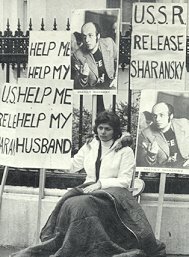Sharansky: Bush is the Dissident President

Natan Sharansky writes in today's OpinionJournal that through his unswerving commitment to his ideals, President George W. Bush has become the "Dissident President."
Natan and Avital Sharansky are two of the people whom I admire most. Natan (then known as Anatoly) and Avital met as activists campaigning in the Soviet Union for the right of Jews to emigrate to Israel. They were married on July 7, 1974. Just three days later, faced with an exit visa to Israel that was about to expire, Avital emigrated to Israel, Natan having assured her that he would follow as soon as possible. Natan's application for an exit visa was denied on security grounds. Natan became a leader in the Soviet dissident movement, working with people such as Andrei Sakharov and Ilena Bonner. He was arrested in 1977, and in 1978 was sentenced to 13 years imprisonment on trumped-up charges of spying for the United States and Israel. His prison time included 16 months in Moscow's notorious Lefortovo prison, much of it in solitary confinement or in a special "torture" cell, and years in the Soviet Siberian gulag. Sharanky's incredible moral strength defeated the efforts of his Soviet jailers to break him. Largely unknown to him, Avital worked tirelessly building international political and diplomatic pressure for his release. In no small part to the championship of his cause by President Ronald Reagan, Sharansky was released from prision and allowed to emigrate to Israel in February 1986. His first words to Avital after their initial embrace, "Sorry that I am so late," typify his self-deprecating humor.
Avital is a very private person, who forced herself to become a public figure in order to save her husband. (The accompanying photo, taken during the campaign to free Natan Shranksky, eloquently depicts the physical and emotional burden that she assumed.) Since Natan's release, Avital has largely retired from public view, content to be a wife and mother in Israel.
Natan has remained an eloquent spokesman for democratic values, but one often unheeded in his own country, Israel. For example, he was one of the first critics, following the Oslo Accords, of the Israeli government's policy of ignoring the corruption and anti-democratic nature of the Palestinian Authority, a policy based on the cynical notion that a regime not bound by democratic contraints can most effectively fight terrorism. More recently, he resigned as a cabinet minister in the government of Ariel Sharon, over Sharon's misguided unilateral disengagement policy. Nathan Sharansky's insistent adherence to his own principles have left him with almost no political constituency in Israel and, when I attended an appearance by Natan Sharansky in a Beverly Hills syngogue some months ago, only a handful of people came to hear one of the moral giants of our time.





0 Comments:
Post a Comment
<< Home